Donoussa Travel Guide: History, Customs, Festivals, Traditions
Explore Donoussa: Discover its rich history, unique customs, lively festivals, and charming traditions.Your ultimate travel guide!

Donoussa Travel Guide
History
Donoussa, one of the lesser-known gems of the Cyclades, holds an intriguing history that dates back centuries. According to archaeological findings, the island has been inhabited since the Early Cycladic period, around 3,000 BC. Various artifacts such as pottery and remnants of settlements suggest that it was an important stop between different islands of the Aegean Sea.
During ancient times, Donoussa was under the influence of the Minoan and later the Mycenaean civilizations. The island’s strategic location made it an ideal stopover for maritime trade in antiquity. References in historical texts, such as those by Pliny the Elder, hint that the island was known for its peaceful and secluded nature.
In more recent history, the Venetians and the Ottomans ruled Donoussa, each leaving their own mark on the island's cultural and architectural landscape. The Venetians introduced fortified structures, while the Ottomans left behind a legacy of local folklore and traditional practices.
Customs
While Donoussa might be small in size, it boasts a rich cultural tapestry woven from the customs and traditions passed down through generations. One of the most engaging aspects of life on Donoussa is the warm hospitality of its residents. Visitors are often greeted with a friendly “Kalos Orisate” (Welcome) and it is customary to be offered a small treat or refreshment.
The way of life on Donoussa is deeply influenced by the rhythms of nature and the Orthodox faith. Many of the island’s customs are tied to religious observance, seasonal cycles, and maritime traditions. Fishermen, for example, bless their boats before launching them into the sea for the fishing season.
Festivals
Donoussa hosts several festivals throughout the year that celebrate its rich heritage and Orthodox faith. These events offer an excellent opportunity for visitors to immerse themselves in the local culture.
Easter Celebrations
Easter is the most significant religious celebration on Donoussa. The Holy Week is marked with numerous processions, and the entire island comes together for feasts, prayers, and traditional music. On Holy Saturday, locals attend the Midnight Service and celebrate the Resurrection with fireworks, candles, and traditional Easter dishes like lamb and “magiritsa” (a type of soup).
Feast of the Dormition of the Virgin Mary (Panagias)
Celebrated on August 15th, this is one of the most important festivals on Donoussa. People gather at the church dedicated to the Virgin Mary to celebrate with a religious service followed by a large feast. Traditional music and dancing continue well into the night.
Donoussa’s Cultural Festival
Held during the summer months, this festival showcases the island’s talents and traditions. Visitors can enjoy local music, dance performances, and sample authentic Cycladic cuisine. The festival also includes art exhibits and craft workshops.
Traditions
Maritime Traditions
Given its island geography, Donoussa has a long-standing relationship with the sea. Many families on the island have a history of fishing, and this tradition is passed on through generations. Boats are considered sacred and are always treated with great reverence.
Craftsmanship
Traditional crafts are an integral part of Donoussian culture. Hand-woven textiles, pottery, and woodwork reflect the island’s heritage. Visitors can often witness artisans at work or purchase high-quality, handmade souvenirs.
Language and Folklore
The language spoken on Donoussa is Greek, but the locals often use a dialect unique to the island. Folklore, folk songs, and stories form an important part of social gatherings, preserving the island’s history and wisdom. Traditional songs called “Mirologia” are particularly significant, often recounting tales of love, sorrow, and the island's history.
Local Anecdotes and Interesting Facts
- It is said that the famous pirate Barbarossa used Donoussa as a hideout during the 16th century.
- The island has a natural water spring, which according to legend, has healing properties.
- Donoussa had a cameo in the 1960s Greek film “Mulberry” directed by Orestis Laskos, known for its breathtaking natural scenery.
- The traditional drink of the island is “raki”, a potent distilled spirit. Many households produce their own and it is a staple at most social gatherings.
- Donoussa boasts pristine beaches such as Kedros and Livadi, both of which have been described as hidden paradises by countless visitors.
